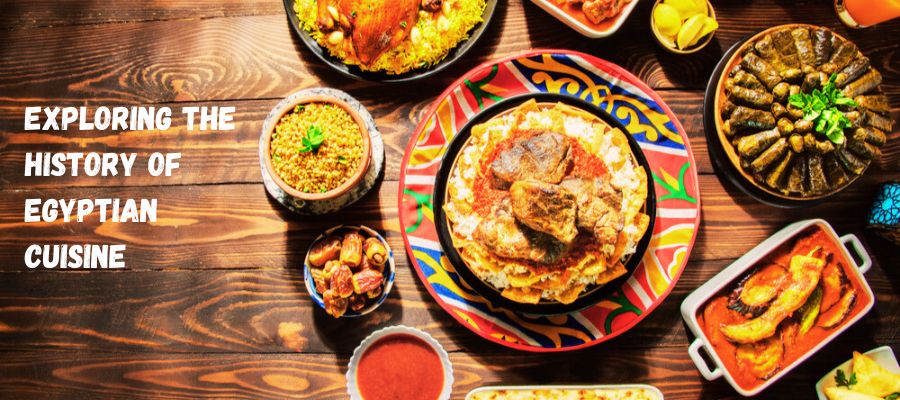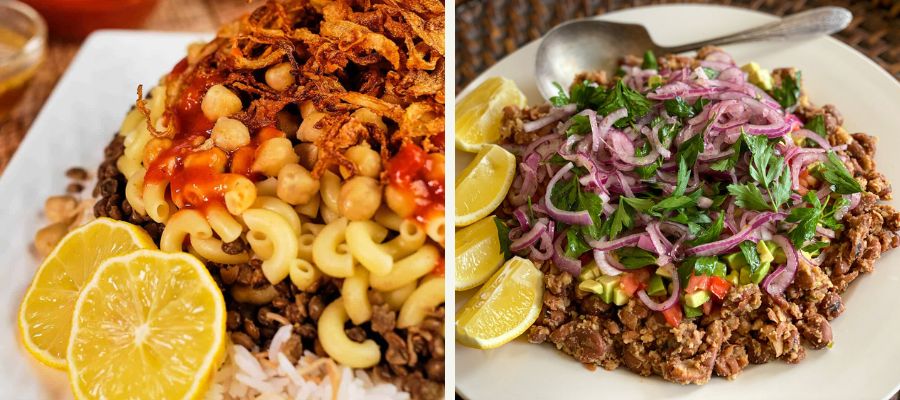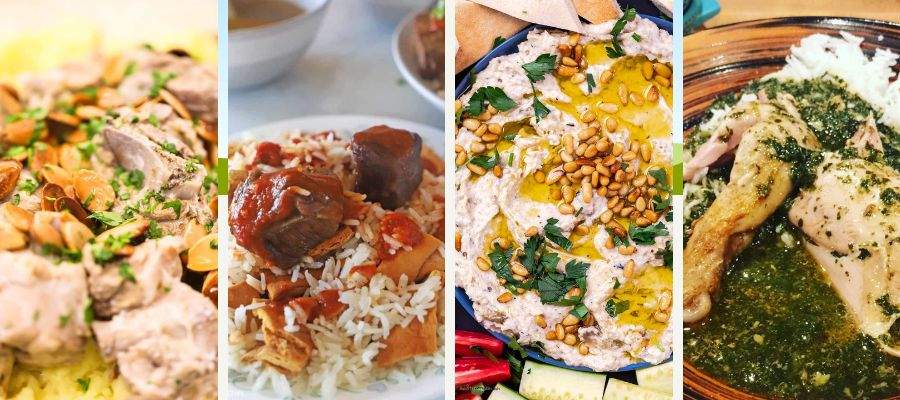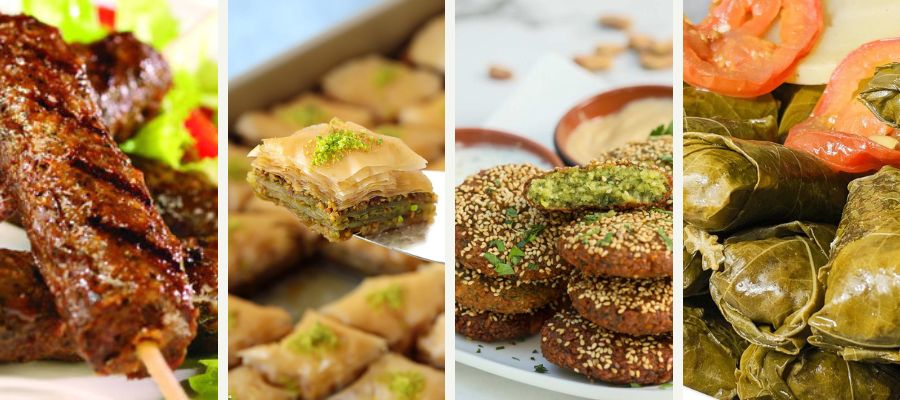If you're curious about traditional Egyptian cuisine, you'll have the perfect chance to explore it on your upcoming trip to Egypt. Before you set off, however, you'll need to obtain an Egyptian visa. If you're unsure about whether or not you'll need a visa, you can find more information on our website. Once you've got your visa sorted, it's time to delve into the rich history of Egyptian cuisine.

Exploring the History of Egyptian Cuisine
Egyptian cuisine has a rich and varied history that dates back to ancient times. Let's take a closer look at some of the key aspects of this fascinating cuisine.
Key Elements of Ancient Egyptian Cuisine
- Bread and legumes were staple foods in the ancient Egyptian diet.
- Vegetables like garlic, onion, cucumber, lettuce, and leek were also important in the cuisine.
- Lamb, pork, and domestic poultry were commonly used meats, while beef was a luxury reserved for special occasions.
- Fish was consumed for mystical reasons, but eating certain types of fish, like the mujol fish, was considered unusual due to its association with the god Seth.
Egyptian Cuisine Today
Today, Egyptian cuisine reflects a diverse range of influences from Africa, the Mediterranean, and the Middle East. You can find a variety of Egyptian recipes that feature a blend of traditional ingredients and modern cooking techniques.
In conclusion, Egyptian cuisine is an integral part of the country's rich cultural heritage, and it continues to evolve and adapt to new culinary trends and influences.
Traditional Egyptian Cuisine: A Delicious Journey
When traveling to Egypt, it's important to keep in mind that pork is not commonly included in local recipes due to the country's religious beliefs.
1.Koshary, Kushari or Koshari
Koshary is a popular dish in Egypt and the Middle East. In fact, many locals consider it to be the national food of Egypt.

Key Ingredients:
- Rice, lentils, and chickpeas
- Caramelized onions and macaroni
- Garlic and vinegar sauce
- Spicy tomato sauce
Koshary is a great option for vegetarians, but you can also find versions with meat. It's widely served in restaurants throughout Egypt, and it's a must-try dish for anyone visiting the country.
2.Ful Medames
Ful Medames is a famous Egyptian cuisine recipe that is cooked slowly over low heat in a copper pot to give it a distinctive flavor. The name of the dish comes from the Egyptian word "ful," meaning "bean," and the Coptic word "medames," meaning "buried," possibly hinting at the cooking method used in the past.
Traditionally, Ful Medames is served with a mixture of garlic and olive oil, along with chopped parsley, onions, and a splash of lemon juice added just before serving. It is also common to pair this dish with shami, a type of pita bread popular in Egypt.
Key Points:
- Ful Medames is a famous Egyptian cuisine dish cooked slowly over low heat.
- It is traditionally cooked in a copper pot for its distinct flavor.
- The dish is typically seasoned with garlic, olive oil, parsley, onions, and lemon juice.
- Shami, a type of pita bread, is often served with Ful Medames.
3.Mulukhiyah, Molokheyya, Molokhia or Mulukhiyyah
If you're curious about typical Egyptian cuisine, consider trying Jute Soup. This dish features leaves from the jute fruit, a bitter-tasting vegetable that softens when cooked and is commonly used in soups and stews.

Jute leaves add a distinctive flavor and help thicken the soup, which is often served with white rice and either chicken or lamb. Jute Soup is not only delicious but also highly nutritious, making it a healthy and satisfying choice when exploring Egypt.
- Jute Soup is a popular Egyptian dish made with jute leaves.
- Jute has a bitter taste that softens when cooked.
- The soup is often served with white rice and chicken or lamb.
- Jute Soup is highly nutritious and a satisfying choice for exploring Egypt.
4.Mansaf
Mansaf is a classic lunch option in Egypt, consisting of lamb, rice, and a dry yogurt known as jameed. The lamb is cooked in the yogurt, while the rice is cooked separately and flavored with turmeric.
To serve, a thin bread called Markook or Shrak is placed at the bottom of the dish, followed by a layer of rice and then the lamb on top. Finally, the yogurt sauce is poured over the dish to taste.
Mansaf is a flavorful and filling meal that has been enjoyed in Egypt for centuries.
- Mansaf is a classic Egyptian lunch made with lamb, rice, and jameed yogurt.
- The lamb is cooked in the yogurt and the rice is flavored with turmeric.
- The dish is served with thin bread at the bottom, covered with rice and then lamb.
- The yogurt sauce is poured over the dish to taste.
5.Baba Ganoush
Baba ganoush is a popular dish in Egyptian cuisine that is known for its delicious mix of spices and ingredients. It is a vegetable paste that is used as a snack and has a one-of-a-kind flavor that harmonizes food and soul. Here are some interesting facts about baba ganoush:
Similarities with Hummus: Baba ganoush shares many similarities with hummus, another popular dish in Egyptian cuisine. Both dishes use tahini, which gives them a creamy texture and nutty flavor.
Aphrodisiac Properties: It is believed that the mixture of various spices used in baba ganoush can be aphrodisiac. This makes the dish even more peculiar and unique in the typical food of Egypt.
Traditional Ingredients: The traditional ingredients used in baba ganoush are roasted eggplant, garlic, tahini, lemon, and pomegranate. These ingredients give the dish its distinct flavor and aroma.
In conclusion, baba ganoush is a must-try dish if you ever get the chance to explore Egyptian cuisine. Its unique flavor and aphrodisiac properties make it stand out among other dishes, and its traditional ingredients are sure to satisfy your taste buds.
6.Fatteh
Fatteh is a classic dish of typical Egyptian food that is loved by locals and tourists alike. Here are some interesting facts about this delicious dish:
What is Fatteh: Fatteh is a dish made with pieces of bread that are toasted or fried and then covered with other ingredients. The name is derived from the Arabic word fatteh, which means "crushed crumbs."
Unique Touch: One of the best things about fatteh is that each home makes it differently, giving it a unique touch depending on personal preferences. There are no rules to making fatteh, and the possibilities are endless.
Versatile Dish: Fatteh can be eaten for breakfast, lunch, or dinner, depending on the ingredients you put in it. It can also be vegetarian, made essentially with chickpeas or eggplants.
In conclusion, fatteh is a must-try dish if you want to discover the authentic flavors of Egyptian cuisine. Its versatility and unique touch make it a beloved dish among locals, and its delicious taste is sure to satisfy your taste buds.
7.Kofta
Kofta is a popular meat dish of Arab origin that is shaped like meatballs or hamburgers. The word "kofta" comes from Persian and means "minced." In Egypt, kofta is typically prepared in the form of kebab, which is rolled up and also known as kabab mashwi. This dish is usually made with a mixture of beef and lamb, and is a staple in the royal Egyptian cuisine.

- Kofta can be mixed with spices and pre-sautéed onions to enhance its flavor.
- To prevent the kofta from falling apart during cooking, rice, vegetables, or eggs can be added to achieve a proper roast.
- Kofta is a common street food in cities like Cairo, and can be found on almost every street corner.
If you are planning to visit Egypt, make sure you try the delicious kofta dish. Don't forget to apply for an Egypt visa beforehand so that you can fully enjoy the local cuisine.
8.Falafel
Falafel is an ancient Egyptian food that has spread all over the world. This vegetarian dish is made of beans, chickpeas, or a mixture of both. In Egypt, the traditional falafel recipe calls for uncooked beans or chickpeas that are soaked overnight. The ingredients are then processed with parsley, coriander, onion, garlic, and spices to create a dough that is formed into balls and fried.
The word falafel comes from the Arabic word filfil, which means "pepper." Interestingly, the most popular version of falafel today is made solely with chickpeas, served on pita bread with tahina (sesame sauce), hummus (creamy chickpea dip), and a variety of salads.
Falafel has been considered a royal Egyptian cuisine and is enjoyed by people all around the globe. Here are some key points to remember about the origins of falafel:
- Falafel is an ancient Egyptian food.
- It is a vegetarian dish made of beans or chickpeas.
- The traditional Egyptian recipe calls for uncooked beans or chickpeas that are soaked overnight.
- Falafel is often served on pita bread with tahina, hummus, and salad.
- The word falafel comes from the Arabic word filfil, which means "pepper".
9.Mahshi
Malfuf Mahshi or cabbage rolls are a popular Egyptian dish that serves as a perfect starter for any meal. The main ingredient in this recipe is cabbage, which imparts a rich flavor to the dish. If you want to try something new in Egyptian cuisine, then Malfuf Mahshi is a must-try dish.
The filling of these cabbage rolls typically includes baharat, which is a blend of spices used in Arab cuisine. The composition of baharat can vary by region and country, with some mixes containing six or seven spices, and others containing up to ten.
Here are the key takeaways about Malfuf Mahshi:
- Malfuf Mahshi is a traditional Egyptian dish made of cabbage rolls.
- Cabbage is the main ingredient that imparts rich flavor to the dish.
- Baharat, a blend of spices used in Arab cuisine, is typically used as a filling in Malfuf Mahshi.
- Baharat can contain a mix of six to ten spices.
- Malfuf Mahshi is a must-try dish for anyone looking to experience traditional Egyptian cuisine.
10.Baklava
Baklava is a traditional cake made with crushed walnut paste (or other nuts) and bathed in syrup or honey. To understand the essence of typical Egyptian cuisine, it's important to delve into its history. The origin of baklava dates back to ancient Mesopotamia, where bread was cooked in wood-fired ovens. This delicious cake was considered a royal Egyptian cuisine until the mid-19th century.
Egyptian cuisine is a sensory delight that offers a range of flavors for the adventurous foodie. So, if you plan to travel to Egypt, be sure to try the local cuisine and immerse yourself in the country's rich culture and history. Don't forget to apply for an Egypt visa before your trip. We wish you a happy journey!
Like
Dislike
To obtain a Egypt eVisa
- Step1: Complete the online application by providing your passport details.
- Step2: Submit payment online using a credit card.
- Step3: Monitor your email for confirmation of payment and receipt of your eVisa, which will be sent electronically.


Comment